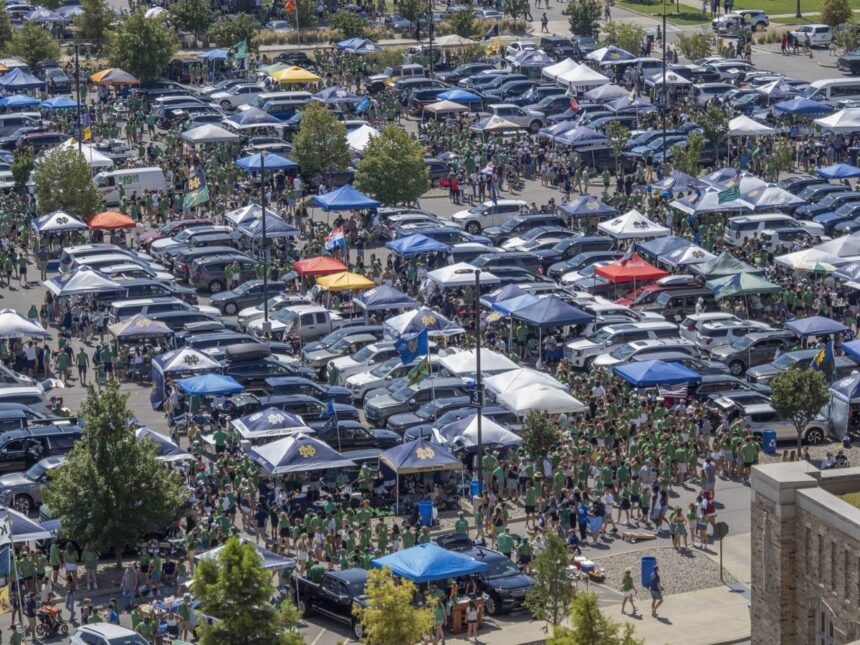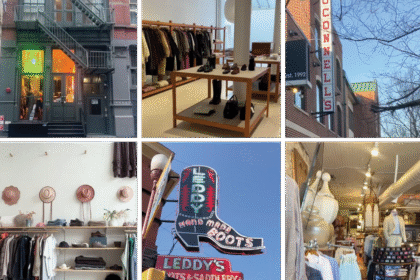One of the best encapsulations of modern college football is, of course, in a commercial.
It takes place in Fansville, where a son asks his dad whether corporate money has changed the sport. The father cracks open a Dr Pepper. The Aflac duck waves an Aflac pennant.
“I just feel like the brands are taking over,” the son says.
To some degree, they have. The sport’s corporatization is no longer confined to bowl games named after mortgage companies, condiments and breakfast goodies. The official name of Georgia Tech’s home venue, the oldest FBS stadium in the country: Bobby Dodd Stadium at Hyundai Field. First downs at Florida State are powered by Dale Earnhardt Jr. Chevrolet. The Big Ten’s rivalry series is presented by Venmo. Private equity investors and corporate logos on uniforms aren’t here yet, but they’re coming.
There is, however, one place where the brands have not yet infiltrated and the naming rights aren’t for sale.
You can still find the soul of college football in the tailgating lots far from the stadium.
Like in Lot 407 at LSU, where William Day and a buddy once plopped a pair of tents by an oak tree. Twenty years later, the oak is gone (cut down to make way for fiber-optic cables), but the tents have grown into a village of purple and gold awnings over a margarita machine, a dance floor and a lot of food. The party spans four generations.
“It just kept growing and growing until it became a family affair,” said Day, the mayor/don of what they call Tigertown Mafia Tailgating.

(Matt Baker / The Athletic)
The story of Day’s domain isn’t much different than the story of college football — a small gathering for fun on an unassuming plot exploded organically into a tribal passion passed down from one generation to the next.
Tailgating intertwined itself into the game early. Georgia fans were so despondent after a loss to Auburn in 1892, the story goes, that they barbecued their own mascot, a goat named Sir William. Somewhere in the 133 years since what Georgia legend Vince Dooley once called “the first postgame tailgate,” cornhole boards, Solo cups and, yes, smoking grills became more than fixtures around the sport’s coliseums. They became memorable parts of twin experiences of college football and campus life.
“Tailgating,” recent Wisconsin graduate Cecelia Kwan said, “is the one time I always felt like I’m a Badger.”
Walk around any lot before any game, and you can feel the blend of petty and pure that’s unique to this sport.
At Wisconsin, a student perches in a dunk tank wearing an Iowa shirt and hawk mask. At Georgia, Jamie Jones serves bison meatballs and buffalo wings before the Bulldogs host Marshall’s Thundering Herd. At Florida State, visiting Miami fan Juan Linares cranks a hurricane siren over the booming music. He bought the siren off Amazon for a couple hundred bucks, but the rest of his amenities — the vibrant TV stands and Sebastian the Ibis panels — are hand-drawn and custom-made by his general contracting business and auto body shop.
“It’s the backdrop to our family,” said Linares, a father of four.
The backdrop changes as you get closer to virtually every stadium. The anyone-is-welcome vibe turns into invitation-only corporate parties and armband-required areas. The colorful canopies — blue and orange in Gainesville, a sea of red in Athens — fade into monochromatic accoutrements. Black tablecloths and chairs in Tallahassee. White tents in Baton Rouge for office get-togethers at The Original Louisiana Hot Sauce Tailgate District.
The brands have taken over there, too.
In these premium spots in premium locations a short walk from the stadium, you can pay a premium price to have someone set up the tailgate for you; all you have to do is show up. For the Iron Bowl, a 10-person party at Auburn’s Tiger Walk runs $2,700 and includes a 43-inch TV, a cooler with ice and an on-site concierge. For Georgia’s home finale against Charlotte, the basic package starts at $742.50.
Or you could hang out for free a couple of blocks away at Tailgate Island. That’s the name of the spot Jones has been governing since 2000 when some members of Georgia’s Redcoat Marching Band stopped by with a couple chairs and a cooler. For this year’s Alabama game, Tailgate Island had a taco bar, a beer pong tournament, loudspeakers and a few dozen people — many of whom only see each other at tailgates.
Jones isn’t against the companies that assemble the parties for you, exactly. But the vibe just isn’t the same.
“It’s too corporate,” Jones said. “It kinda takes away from the heart and soul of the tailgate.”

(Matt Baker / The Athletic)
And the heart and soul of the tailgate are the heart and soul of college football.
Any restaurant can fry up alligator tail nuggets. But trapping, hunting and cleaning four bayou gators to serve with crawfish and fettuccine in the RV lot before the Florida-LSU rivalry game, as Mike Langlinais did? Or red-and-black clad strangers pausing by TVs in Athens to see if Wake Forest can upset Clean, Old-Fashioned Hate rival Georgia Tech in overtime? Or Bob Casaceli serving cheesesteak sliders and hot dogs to parking lot attendants at UMass before cheering on the nation’s worst team in a 45-3 Wednesday night MACtion loss to Northern Illinois? Those are the organic, shared experiences this sport creates and cultivates better than anything else.
“College football is about the grassroots,” said Day, the mayor/don at LSU. “We’ve got to have corporate money, but the grassroots is what makes it live forever.”
Although the corporate money is still parked close to the stadium, Day wonders whether the grassroots are in danger of disappearing like the old oak tree. And with good reason.
Now that schools are paying players directly through revenue-sharing, they’re searching harder for every new cent, leaving longtime, middle-class fans feeling squeezed out. If teams can charge fans a seat licensing fee for the right to buy a ticket they’ve held for years, why can’t they start charging them a tailgate licensing fee for the right to use a specific plot they’ve claimed for decades?
“The idea of selling you your spot, that’s the next big thing, I’m sure,” said Bill Sutton, a professor of practice at South Carolina’s College of Hospitality, Retail and Sport Management.
Fortunately for Day, it hasn’t yet hit LSU. The brands haven’t taken over his corner of Lot 407, where nearby parties honor his group’s yellow and white sign: “Please respect our long time tradition of tailgating at this site.”
Day doesn’t ask for much. The regulars pay their dues by cooking something during the season, but no one (sober) gets turned away. Before the Florida game, 18 Minnesotans in town for a bachelor party stopped by.
They weren’t strangers for long. They were fellow college football fans joining in the quintessential college football experience that comes with free flowing drinks and fiery grills far from the stadium on fall Saturdays.
“Don’t squeeze this out,” Day said. “You can’t squeeze this out.”
— The Athletic’s Scott Dochterman contributed to this story.
















